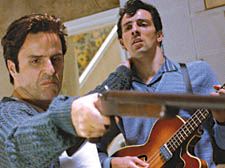|
|
 |
| |

Con O’Neill as Joe Meek and Ralph Little as bassist Chas Hodges |
Meek’s Greek tragedy as the man
IT was a good time to be involved in the pop industry: London was about to swing, and for Joe Meek, an independent record producer, the booming interest in young British men picking up guitars and trying to mimic Lonnie Donegan meant he had a bevy of potential pop stars at his disposal.
The life – and tragic suicide – of Meek is now the subject of a new film by Fitzrovia-based actor Nick Moran. He has turned the life of Meek, who produced hit singles from a dingy flat in Holloway Road, into Telstar, a bio-pic charting the rise and rapid fall of this early pop svengali.
Moran says he was dimly aware of Meek but it was a drunken taxi journey back in 1995 that prompted him to investigate Meek’s life further.
“I first noticed a grimy plaque above a shop in Holloway Road after a night out,” he reveals.
“I became fascinated by the fact it said ‘Joe Meek lived, worked and died here’.”
Nick, known for playing Cockney hard lad in Guy Ritchie’s Lock, Stock and Two Smoking Barrels, decided it would make a good stage play and after success in the West End he re-wrote it for the cinema. Meek was gay, which led him to be subjected to vile homophobia. He was also a maverick, suffering from obsessions, depression, a strong belief in psychic nonsense, a nasty pill addiction and, surprisingly for some one who was a magical musical producer, was tone deaf.
“Joe Meeks’ story is a Greek tragedy,” says Nick.
“It is a story of a man’s journey into loneliness and despair.”
Although Meek was clearly a pop genius, as the film shows, he was also at times pig-headed: The Beatles came to him four times before they were famous. He told Brian Epstein to go back to Liverpool and forget managing pop stars. Later in his career, when his studio was in severe difficulties, he turned down the chance to take on a salaried role at the Beatles’ Abbey Road studios – apparently because he had an aversion to taking orders since his father was severely injured because of the stupidity of an officer during the Great War. Within five years of writing “Telstar”, the Tornados single that topped the US charts – the first time a British record had done so – he was bankrupt. He then murdered his landlady in a crazed fit and then shot himself.
Yet Moran says the film is not meant to be too sad, and makes the point that truth is often stranger – and funnier – than fiction.
“The thing about tragedy, when something goes wrong, there tends to be a funny side to it as well,” he says.
“For example, here was this music genius who turned down the Beatles because he thought they were rubbish,” he said. He also cites the fact that Meek claimed the music he wrote for the band The Outlaws came to him from when he was contacted beyond the grave by Buddy Holly.
“Since I started researching the story of Joe people have come forward and volunteered so much information,” he said. “I received stuff that made the whole thing richer and more interesting.”
DAN CARRIER
CLICK HERE FOR REVIEW OF TELSTAR
|

|
 |
Your comments:
|
|
 |
|

